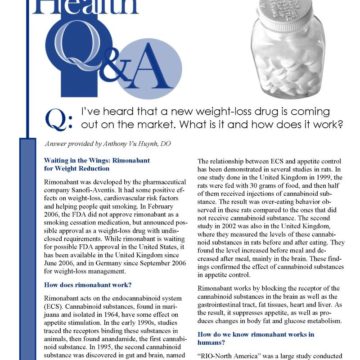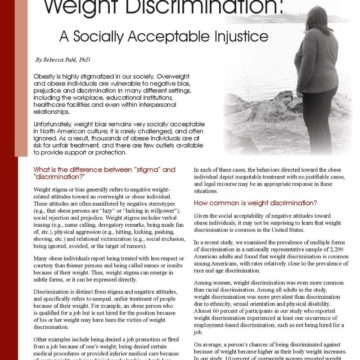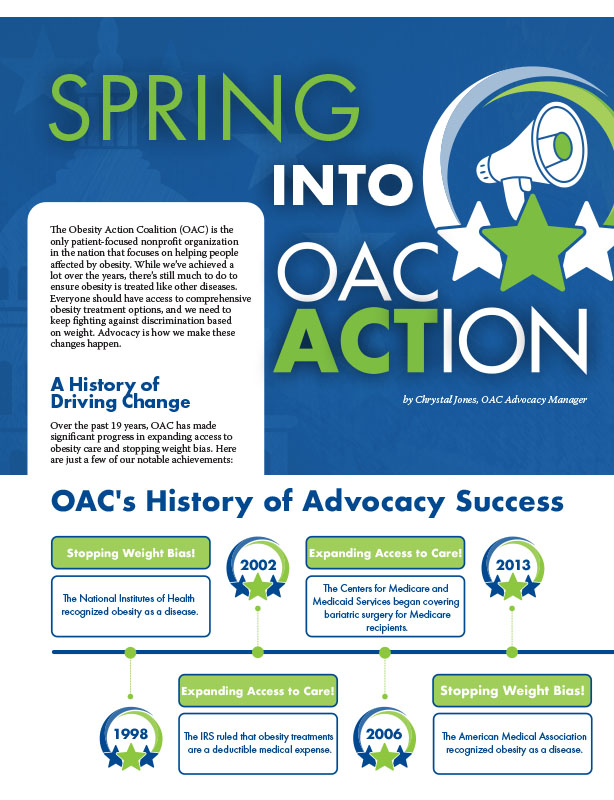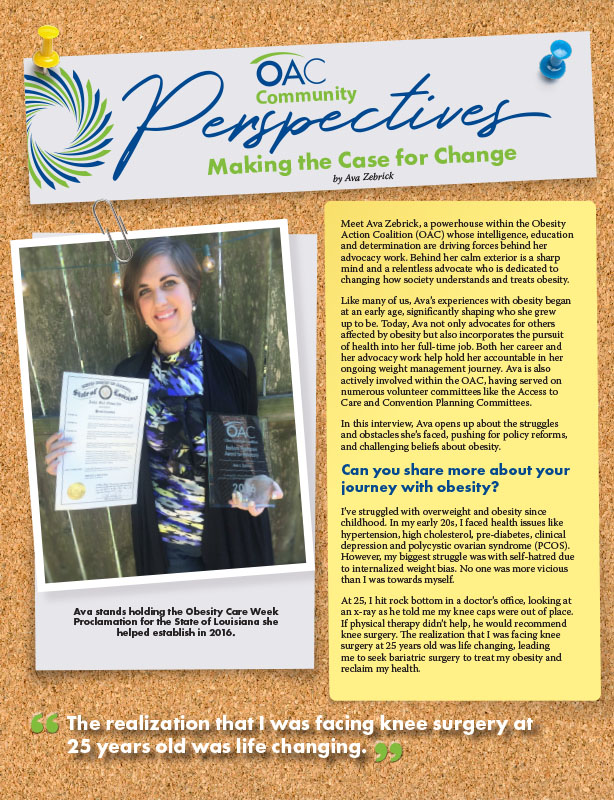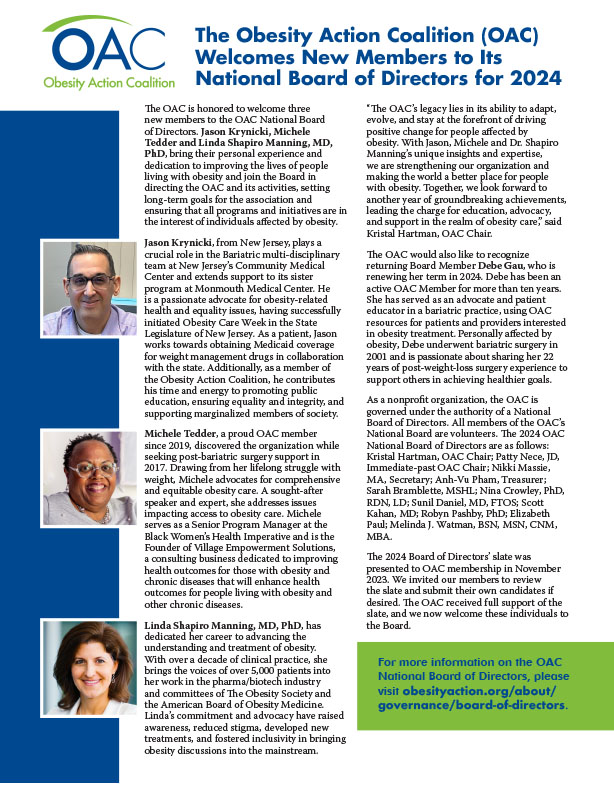Understanding the Negative Stigma of Obesity and its Consequences

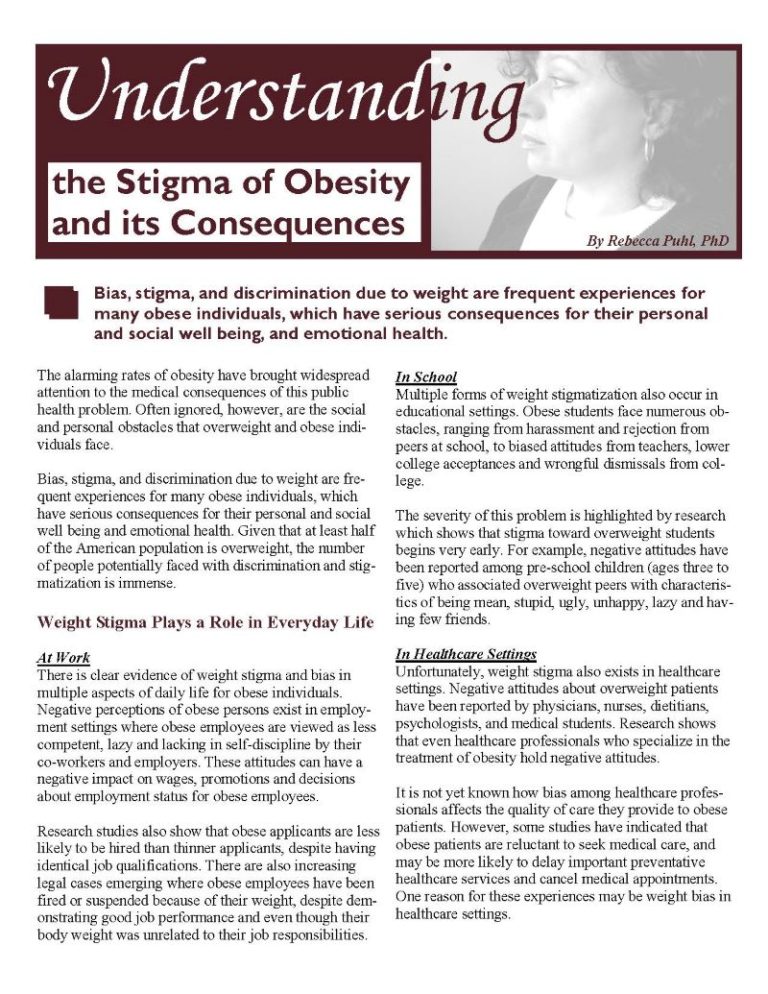
By Rebecca Puhl, PhD
Spring 2006
The alarming rates of obesity have brought widespread attention to the medical consequences of this public health problem. Often ignored, however, are the social and personal obstacles that individuals with excess weight or obesity face.
Bias, stigma, and discrimination due to weight are frequent experiences for many individuals with obesity, which have serious consequences for their personal and social well being and emotional health. Given that at least half of the American population is overweight, the number of people potentially faced with discrimination and stigmatization is immense.
Weight Stigma Plays a Role in Everyday Life
At Work
There is clear evidence of weight stigma and bias in multiple aspects of daily life for individuals with obesity. Negative perceptions of persons with obesity exist in employment settings where employees with obesity are viewed as less competent, lazy and lacking in self-discipline by their co-workers and employers. These attitudes can have a negative impact on wages, promotions and decisions about employment status for employees with obesity.
Research studies also show that applicants with obesity are less likely to be hired than thinner applicants, despite having identical job qualifications. There are also increasing legal cases emerging where employees with obesity have been fired or suspended because of their weight, despite demonstrating good job performance and even though their body weight was unrelated to their job responsibilities.
In School
Multiple forms of weight stigmatization also occur in educational settings. Students with obesity face numerous obstacles, ranging from harassment and rejection from peers at school, to biased attitudes from teachers, lower college acceptances and wrongful dismissals from college.
The severity of this problem is highlighted by research which shows that stigma toward overweight students begins very early. For example, negative attitudes have been reported among pre-school children (ages three to five) who associated overweight peers with characteristics of being mean, stupid, ugly, unhappy, lazy and having few friends.
In Healthcare Settings
Unfortunately, weight stigma also exists in healthcare settings. Negative attitudes about overweight patients have been reported by physicians, nurses, dietitians, psychologists, and medical students. Research shows that even healthcare professionals who specialize in the treatment of obesity hold negative attitudes.
It is not yet known how bias among healthcare professionals affects the quality of care they provide to patients with obesity. However, some studies have indicated that patients with obesity are reluctant to seek medical care, and may be more likely to delay important preventative healthcare services and cancel medical appointments. One reason for these experiences may be weight bias in healthcare settings.
How Obesity is Perceived Impacts the Negative Stigma
Perceptions about the causes of obesity may be partially responsible for this stigma and bias. Assumptions that obesity can be prevented by self-control, that patient non-compliance explains failure at weight-loss, and that obesity is caused by emotional problems, are all examples of attributions that contribute to negative attitudes. Additional research suggests that beliefs about the causality and stability of obesity are also important factors contributing to negative attitudes. For example, studies show that individuals with obesity are more likely to be stigmatized if their overweight condition is perceived to be caused by controllable factors compared to uncontrollable factors (e.g., overeating versus a thyroid condition), and if obesity is perceived to be personally changeable rather than an irreversible condition.
Taken together, the consequences of being denied jobs, rejected by peers, or treated inappropriately by healthcare professionals because of one’s weight can have a serious and negative impact on quality of life. Individuals with obesity suffer terribly from this, both from direct discrimination and from more subtle forms of bias and stigma that are frequently encountered.
What Can be Done to Eradicate the Problem of Weight Bias?
Given how pervasive and acceptable weight stigma is in our society, transforming societal attitudes and enacting laws that prohibit discrimination based on weight are needed in order to eliminate the problem of stigma toward individuals with obesity. Although this requires enormous efforts, there are other important steps that can be taken by both patients and their healthcare providers to help improve the daily functioning and well-being of individuals with obesity.
Patients as Advocates
Patients who are struggling with weight stigma can begin to approach this problem by becoming advocates for themselves. This includes identifying situations in which they have been stigmatized because of their weight and deciding how best to handle the situation to achieve positive emotional health to help prevent additional stigma from occurring.
An Important Role for Healthcare Professionals
Healthcare can easily become a negative and shaming experience for patients with obesity because of weight stigma. Therefore, healthcare professionals have an extremely important role to play in addressing the problem of weight bias. Encouraging patients to share their experiences of stigma and to help them feel less isolated in these experiences is an important first step. Clinicians can also help patients identify ways to effectively cope with stigma, such as using positive “self-talk,” obtaining social support from others and participating in activities that they may have restricted due to feelings of shame about their weight. These tools can help reduce the tendency of individuals with obesity to internalize negative stereotypes of obesity and blame themselves, both of which can negatively impact emotional well-being.
A second role for healthcare professionals is to address the issue of weight bias within themselves, their medical staff, and colleagues. In order to be effective and empathic with patients with obesity, this requires honest self-examination of one’s own attitudes and weight bias. Education can help increase awareness among healthcare professionals about the pervasiveness and consequences of weight bias and can also encourage providers to adopt a more accurate and empathic understanding of their patients with obesity.
Finally, healthcare professionals can do a great service to their patients with obesity by improving the physical and social environment of healthcare settings. This means having bathrooms that are easily negotiated by heavier patients, sturdy armless chairs in waiting rooms, offices with large exam tables, gowns and blood pressure cuffs in appropriate sizes and reading materials for patients that are appropriate and “weight-friendly” (rather than fashion magazines with thin supermodels).
Healthcare professionals can also improve their interpersonal interactions with patients with obesity by being sensitive to situations of embarrassment for patients, such as weighing patients in a private and sensitive matter, without judgmental commentary. Providers can also help by emphasizing goals of health and fitness behaviors (rather than only the number on the scale) and celebrating positive health behavior changes made by patients.
Strategies to Deal with Weight Stigma
- Educate others about the stigma of obesity to help challenge negative attitudes.
- Obtain social support from others who are struggling with weight stigma, or from friends and family members who are supportive.
- Instead of avoiding enjoyable activities because of negative feelings about your weight, set goals to ease these restrictions and participate more fully in these experiences.
- Rather than feeling inferior, practice positive self-talk strategies that emphasize self-acceptance and positive self-esteem.
- Be vocal about individual needs and positively assert these to appropriate individuals (e.g., requesting larger-sized medical gowns from a healthcare provider).
- Communicate to the perpetrator of bias that his or her comments were inappropriate and hurtful, and that nobody deserves such unkind remarks, regardless of their weight.
- Participate in public groups to protest weight stigmatization. The National Association for the Advancement of Fat Acceptance (NAAFA) is one such advocacy group which promotes size acceptance, fights weight discrimination, and publicly campaigns to challenge stigma.
- Talk to a therapist to help identify effective ways to cope with stigma and to replace self-defeating thoughts or self-blame with healthier ways of coping.
It is important to note that there are many different strategies of coping with weight stigma and some strategies may be more or less effective with different types of stigmatizing situations.
About the Author:
Rebecca Puhl, PhD, is the Coordinator for Community and Weight Stigma Initiatives at the Rudd Center for Food Policy and Obesity at Yale University. Dr. Puhl is responsible for identifying and evaluating promising community nutrition programs and coordinating research and policy efforts aimed at reducing weight bias. Dr. Puhl received her Ph.D. in Clinical Psychology from Yale University. In addition to seeking ways to reduce weight bias, Dr. Puhl’s research examines societal and behavioral contributors to obesity.
References:
Puhl R, Brownell KD. Bias, discrimination, and obesity. Obesity Research. 2001;9:788-805.
Puhl R, Brownell K. Ways of coping with obesity stigma: Conceptual review and analysis. Eating Behaviors. 2003; 4: 53-78.
Schwartz MB, O’Neal H, Brownell KD, Blair S, Billington C. Weight Bias among health professionals specializing in obesity. Obesity Research. 2003;11:1033-1039.
Brownell KD, Puhl RM, Schwartz MB, Rudd L. Weight bias: Nature, extent, and remedies. NY: Guilford Press, 2005.
by Chrystal Jones, OAC Advocacy Manager Spring 2024 The Obesity Action Coalition (OAC) is the only patient-focused…
Read Articleby Ava Zebrick Spring 2024 Meet Ava Zebrick, a powerhouse within the Obesity Action Coalition (OAC) whose…
Read ArticleThe OAC is honored to welcome three new members to the OAC National Board of Directors. Jason Krynicki,…
Read Article




